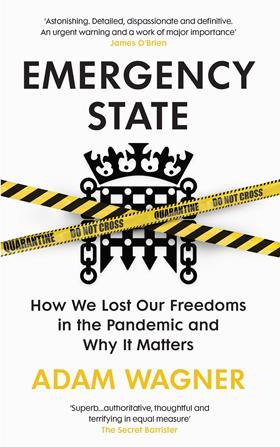How Covid chaos curbed our liberties
Emergency State: How We Lost Our Freedoms in the Pandemic and Why it Matters
Adam Wagner
£14.99, Bodley Head
★★★★★
We all have our own experiences of Covid-19. For me, during the thick of the pandemic, a planned wedding was delayed and then rapidly slimmed down. I then prepared for the birth of a baby and was not permitted to attend most of the antenatal scans due to social distancing rules. When it came to our wedding, we had to consider whether to follow the government’s guidance as well as the law.
But why were they different? Why was there constant confusion, often from ministers on the radio, about how our lives were restricted? Could we sit on a park bench? All these questions became even more confusing in the difficult summer of 2020 and for most of 2021.

Many lawyers turned to Doughty Street barrister Adam Wagner who had begun to provide guidance through his Twitter account. Indeed, his explanations of the law were much more accessible than any of the government websites.
He was the only person who could have written this book, which provides a comprehensive account of the laws which restricted our lives for the entirety of the pandemic. The book starts with the history of pandemic laws from the Public Health Act 1984 and the fact that the Coronavirus Act 2020 was based on the draft of a ‘Pandemic Flu Bill’ which had been developed in secret in 2016.
Most concerning is that coronavirus law-making became so incredibly difficult to understand that people were simply unaware and had no way to confirm that they were actually adhering to the law. Even the police were confused. Wagner describes the ‘chaotic’ way in which the government communicated their position. Just reading it brings back memories of times when we regularly needed to Google what precisely we were permitted to do.
Wagner has the added perspective of a human rights practitioner, balancing the freedoms that we all generally accept with the need to stop a deadly disease. He was a protagonist in the Reclaim These Streets litigation and gives a first-hand account of the challenges he faced. He then writes about the questionable behaviour of those, at Number 10, who had infringed the rules they drafted and offers some suggestions for future pandemic legislators.
This book is the definitive legal guide to the law of the pandemic and will serve as an important historical account of this dark and challenging period in our history.
Benjamin Seifert is a specialist public law and extradition practitioner at Temple Garden Chambers, London































No comments yet